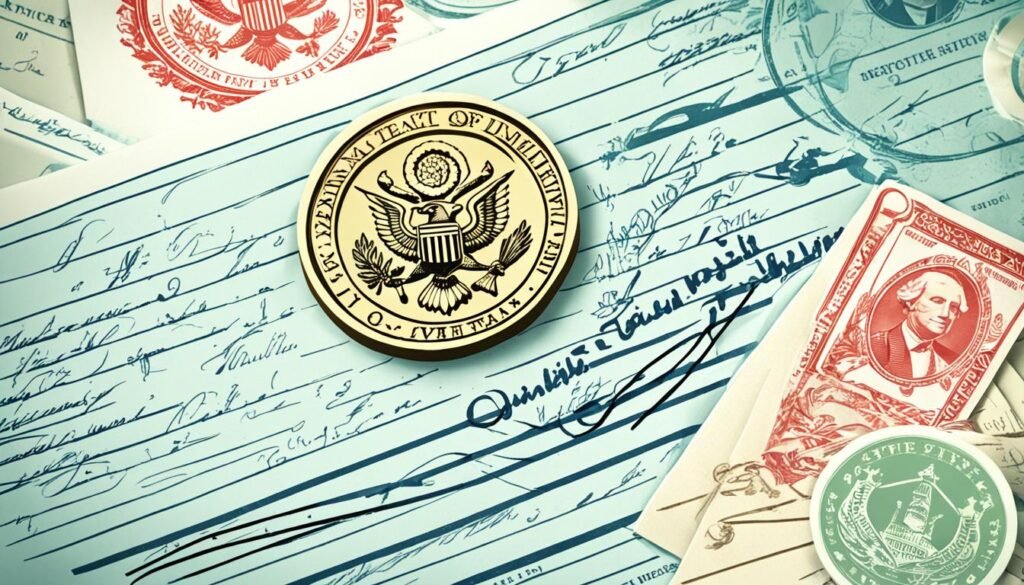Estate planning is key for anyone wanting to protect their assets and care for their loved ones after they’re gone. We often talk about wills and trusts as important tools in this process. It’s vital to know how they differ to make smart choices about who gets what.
In the U.S., inheritance laws change by state. That’s why working with skilled estate planning lawyers is crucial. They can help you make a detailed estate plan that meets your needs and goals.
Wills have long been a common choice, but trusts are becoming more popular for their flexibility and benefits. We’ll look into how these two tools differ and why you might pick one over the other.
Key Takeaways
- Estate planning is key for smoothly passing on assets and protecting them
- Wills and trusts are core legal tools in estate planning
- Trusts give more control over how assets are given out
- Revocable trusts can skip probate and cover if someone becomes unable to make decisions
- Talking to estate planning lawyers is important for a solid plan
Understanding Estate Planning Basics
Estate planning is key to protecting your assets and making sure your wishes are followed after you pass away. We’ll look into the main parts of estate planning. It’s important for everyone, no matter their wealth or age.
What is estate planning?
Estate planning means making a plan to manage and share your assets while you’re alive and after you’re gone. It includes making legal documents that state your wishes for your stuff, money, and health care.
Importance of estate planning documents
Estate planning documents are crucial for making things clear for your loved ones. They help avoid family fights and make sure your loved ones get what you wanted them to have. Important documents include wills, trusts, powers of attorney, and advance healthcare directives.
Legal instruments for asset distribution
There are different legal tools for sharing out assets in estate planning. Wills and trusts are two main documents that help manage and pass on property. Let’s look at how they differ:
| Aspect | Will | Trust |
|---|---|---|
| Effective Date | After death | Can be during life or after death |
| Probate Process | Required | Often avoids probate |
| Privacy | Public record | Generally private |
| Flexibility | Less flexible | More flexible |
| Fiduciary Relationships | Executor | Trustee |
Knowing these basics of estate planning is key to making a solid plan. This plan will protect your assets and respect your wishes. We’ll go deeper into wills and trusts next.
Wills: The Foundation of Estate Planning
A will is key to estate planning. It’s a legal document that shares your final wishes. We’ll look at what a will does, its main parts, and things to know about its limits.
Definition and Purpose of a Will
A will is a document that tells how you want your things spread out after you’re gone. It lets you pick who gets what, choose someone to manage your stuff, and pick guardians for kids. This way, your wishes are followed, and your family finds peace.

Key Components of a Will
A good will has important parts:
- Beneficiary designations
- Executor appointment
- Guardian nominations for minor children
- Specific bequests or gifts
- Residuary estate distribution
Limitations of Wills in Estate Planning
Wills are vital but have some downsides:
| Limitation | Description |
|---|---|
| Probate Process | Wills must go through probate, which can be slow and expensive |
| Public Record | After death, wills become public, which can be a privacy issue |
| Asset Coverage | May not cover all your stuff, especially if it has other owners or beneficiaries |
| Incapacity Planning | Doesn’t help manage your stuff if you can’t make decisions anymore |
Knowing these limits helps make a full estate plan. This might include trusts to meet certain needs and goals.
Trusts: Advanced Estate Planning Tools
Trusts are more complex than wills in estate planning. We’ll look at the different types of trusts, their benefits, and how they work.
Types of Trusts
There are two main kinds of trusts: revocable and irrevocable. Revocable trusts can be changed by the grantor while they are alive. Irrevocable trusts can’t be changed once they’re made.
| Revocable Trusts | Irrevocable Trusts |
|---|---|
| Can be modified | Cannot be changed easily |
| Assets remain in grantor’s control | Assets removed from grantor’s estate |
| Less tax benefits | Greater tax advantages |
Benefits of Trusts in Estate Planning
Trusts have many benefits over wills. They help avoid probate, keep things private, and plan for when someone can’t make decisions. Trusts let you control how assets are given out, like giving money to young people over time.
Trust Administration and Management
Managing a trust means following the trust’s rules. Sometimes, you might need a professional to help. The person in charge of the trust, called a trustee, handles the money, gives out income, and files taxes.
It’s important to know the differences between trusts and wills for good estate planning. While wills are a basic tool, trusts offer more ways to protect and share out assets.
Difference Between Trust and Will
Estate planning tools include trusts and wills. It’s important to know the difference for managing your estate well. This comparison will help you decide how to handle your assets.
Wills take effect after death and go through probate, a court process. Trusts start working as soon as you sign and fund them. This timing affects how quickly your beneficiaries get to your assets.
Privacy is another key factor. Wills become public records during probate, but trusts keep your estate private. If you want to keep your asset distribution private, trusts are better.
| Feature | Will | Trust |
|---|---|---|
| Activation | After death | Upon creation |
| Privacy | Public record | Private |
| Probate | Required | Can be avoided |
| Control | Limited | Extensive |
| Cost | Less expensive | More expensive |
Trusts give you more control over how assets are given out and can cover for if someone becomes unable to manage their affairs. They are flexible tools for estate planning. Wills are simpler but might not let you control asset distribution as much.
Using both tools together in an estate plan works well. A pour-over will can add to a trust by moving any left-over assets into it after death. This makes sure your estate is fully covered.
Probate Process and Its Impact
The probate process is key in estate planning and how assets are shared out. We’ll look into what probate means, how trusts can skip this step, and the perks of avoiding probate.
Understanding Probate
Probate is the legal step of checking a will and making sure a deceased person’s assets are given out. It’s overseen by a court to make sure inheritance laws are followed and debts are paid. But, probate can be slow and makes personal affairs public.
Trusts as a Probate Alternative
Trusts help you avoid probate. By putting assets in a trust, they’re not seen as part of your probate estate. This lets your beneficiaries get their inheritance without going to court, making things quicker.
Benefits of Bypassing Probate
Skipping probate with trusts has many upsides:
- Faster asset sharing with your loved ones
- Less legal fees and court costs
- More privacy for your estate matters
- Less chance of family disagreements
While probate has its benefits, like court oversight, many prefer the privacy and speed of trusts for their estate plans. It’s important to think about what’s best for you.
Conclusion
Estate planning is key to making sure your wishes are followed after you’re gone. It’s about picking the right legal tools for your situation. Wills are a basic way to plan your estate, while trusts give you more control and can help avoid probate.
Often, using both wills and trusts in your estate plan is best. They work together to make sure your assets go where you want them to. The size and complexity of your estate and your needs will help decide which tools to use.
It’s smart to get help from an estate planning lawyer who knows the ins and outs of trusts and wills. They can guide you in making the best choices for your estate. With their help, you can make a plan that keeps your assets safe and gives you peace of mind for your family.

